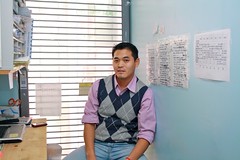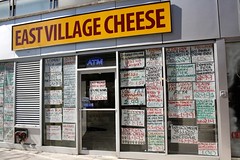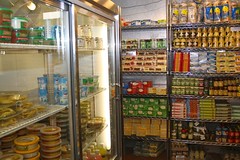Today The Local is turning its attention to the monks of the East Village. Earlier we heard from an investment banker turned Bhakti monk. Now: a pair of former monks turned cheese mongers.
Around the corner from Astor Place, the East Village Cheese shop is a long way from the Himalayan plateau, where owners Thupten Tenphel, 35, and Lobsang Tsultrim, 29, grew up. Like many who opposed the Chinese occupation of Tibet, they were forced to flee the country in the 1990s because of their political views. Neither spoke a word of English when they arrived in New York, but they found work at East Village Cheese and taught themselves in part by listening to chatter in the cramped, bustling store.
On a recent afternoon, as employees waited on customers, they spoke about their journey. Sharing a desk in a small office behind the counter, the two also share a timid, humble nature – a vestige of their upbringing as Buddhist monks. From time to time, they even complete each other’s sentences when command of the new tongue wavers.
When Mr. Tenphel first went into exile, he spent more than five years at the Sera monastery in South India. Meanwhile Mr. Tsultrim escaped to Nepal, where he spent a year in a monastery before a teacher funded his voyage to the United States. “I heard my friends say that America was a place that was free,” he said, a smile sprawled across his face.
Mr. Tenphel arrived in New York in 1998. After taking a few odd jobs, he found work in the cheese shop. He met Mr. Tsultrim in 2001 through other Tibetan expatriates, and convinced him to join him at the store. The shop’s then owner, Alvin Kaufman, a convert from Judaism to Buddhism, took interest in his two employees and often brought them to Three Jewels, a Buddhist community center on Fourth Avenue.
Cheese mongering was a change of routine for the former monks. “It takes getting used to,” Mr. Tenphel said, “but now we like it.”
When Mr. Kaufman, 73, wanted to retire in 2005, he asked the pair if they were interested in buying. They agreed to take over, and haven’t changed a thing about the selection of cheeses or the narrow yellow-and-green interior crowded with large display cases and packed refrigerators. The counter boasts an overwhelming selection of both authentic and soy versions of popular cheeses, sold at a half-pound minimum (brie and gouda are the most popular varieties, according to Mr. Temphel). In the rear, racks are loaded with flavored crackers, toast points, rice cakes, fig jams, marinated olives and artichokes, and fresh breads.
Since taking over, the owners have hired several new employees, mostly Tibetan immigrants. Rookies start in the back, cutting cheese, and eventually graduate to manning the counter as their knowledge and language skills improve.
Some staff remains from when the shop changed hands. Aida Turbi, 37, has been cheerfully greeting customers for 15 years. With a white cap covering her long brown hair, she described her bosses as “kind, polite and sincere men.”
Both men, who commute in from Queens, met their wives in New York, and are now fathers of young children. When time permits, they attend rallies in support of Tibet, and they send funds home to their brothers, sisters and cousins on a regular basis.
“Tibet is not free,” said Mr. Tsultrim. “You cannot even own a picture of the Dalai Lama, or a Tibetan flag.”
Tenzin Dickyi, who works at the Office of Tibet as Special Assistant of His Holiness the Dalai Lama’s Representative to the Americas, estimated that there are about 5,000 Tibetans currently living in New York. Before the Tibetan uprising in 2008, about 2,000 people sought exile from the country ever year, but these figures have fallen as the Chinese government has enforced more stringent border restrictions.
As to whether he will ever return to Tibet, Mr. Tsultrim said he hoped to be able to visit once he establishes his American citizenship. He took a characteristic pause for thought and said, “I do miss home.”






